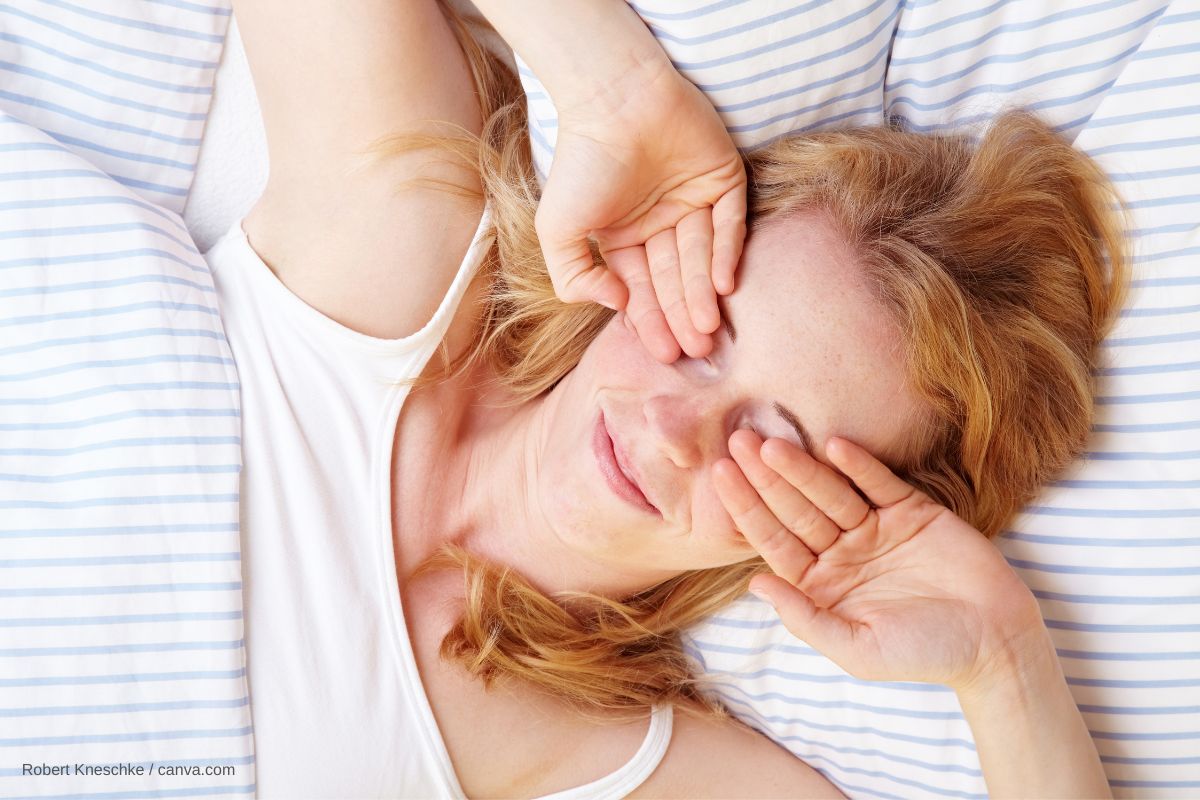Sleep in the Eyes – What Are the Causes?

Having sleep in your eyes when you wake up is a completely normal phenomenon. As a child, many of us believed the Sandman would sprinkle magical sand in our eyes at night to make us sleepy and help us fall asleep. As we got older, we realized that this explanation was not entirely true. Find out here how sleep really gets into your eyes – and whether it says anything about the quality of your sleep.
How does sleep form in the eyes?
If we find sleep in our eyes in the morning, it's not because we've had a secret visit from the sandman. The small grains feel like sand and form overnight in the inner corners of our eyes. Sleep is made up of a mixture of fluids that actually protects and cares for our eyes. To prevent damage to our pupils, they need to be kept moist during the day and at night. This task is performed by our tears, together with a viscous secretion that is produced in the conjunctiva, and special glands on the underside of our eyelids. Thanks to this fluid secretion, our eyes are not only cleaned and protected, but also supplied with nutrients at the same time. Of course, this secretion is not made of sand. Instead, it is made up of salts, proteins, and cell residues. In addition, decomposition products of white blood cells are found in the eye fluid, which are responsible for the immune defense against germs, bacteria, and viruses. The small grains forming a sleep crust in your eyes are therefore a sign that your immune system has been busy doing its job during the night.
Why does sleep gunk only form at night?
As the small incrustations of sleep in our eyes are due to a normal cleansing process, the question arises as to why we do not find the mixture of dried secretions and dead cells in our eyes during the day. After all, we also produce enough tear fluid during the day to moisturize our eyes. We constantly spread this film of tears over our eyes by blinking. However, when we sleep at night, we keep our eyelids closed. Since we don't blink, tear fluid collects at the edges of the eyelids during the night. In the morning, however, we do not find tears in our eyes, but only crystallized components of them together with cell remnants and dust particles. The dry sleep crust forms because the water of the tears evaporates overnight.

How much sleep in your eyes is normal?
You may have noticed that the amount of sleep in your eyes varies. Some days you wake up with less eye goop, while other days your eyes are all gunked up when you wake up. This is easily explained if we take a look at how our immune system works. It is quite natural that the body's immune defense is subject to fluctuations, like any natural process. After all, the intensity with which our immune system has to work depends on our daily activities and the stresses to which we are exposed. A temporary overproduction of sleep gunk is therefore no cause for concern.
The formation of sleep particles in the eyes is completely harmless for most people. However, there are rare exceptions. If you wake up night after night with clogged eyes and your eyes are very red or cause you pain, you may have caught conjunctivitis – pink eye. An acute infection produces a large amount of sleep in the eyes as the immune system is busy destroying the bacteria and germs. If you suspect an inflammation of the conjunctiva as the cause of your excessive production of sleep gunk, you should definitely consult an ophthalmologist.

How do I gently remove sleep crust from my eyes?
To walk around during the day with remnants of sleep in your eyes is likely something very few people find desirable. Many don't even give it much thought in the morning before casually rubbing the sleep out of their eyes. If this is your habit, you should switch to a gentler method for the sake of your health. Rubbing spreads the sleep in your eyes, which can irritate them unnecessarily. Particularly as germs may be transferred to your eyes through your fingers. It is better to wash your face with clean water after getting up in the morning. This allows you to gently rinse the sleep crust out of your eyes and clean them without irritating them further.
What does sleep gunk say about the quality of my sleep?
The production of sleep in our eyes only starts when we sleep. Can sleep gunk therefore provide information about the quality of our sleep? No. In fact, there is no direct link between the amount of eye goop we produce and the quality of our sleep. So, whether you find a lot or a little of the grains in the corners of your eyes in the morning, you can enjoy a comfortable night's sleep either way. How well you recover overnight depends more on completing several sleep cycles and spending enough time in the different sleep phases. To support a healthy sleep cycle and enjoy a better quality of sleep, you can follow our helpful tips for good sleep hygiene. Of course, a comfortable bed with a high-quality mattress also plays a crucial role. At Swissflex, we support your sleep comfort with high-quality bed systems that guarantee a feather-light lying sensation - for optimal rest night after night.
Photo credits:
Robert Kneschke / canva.com
Oksana Restenko / canva.com
RossHelen / canva.com
